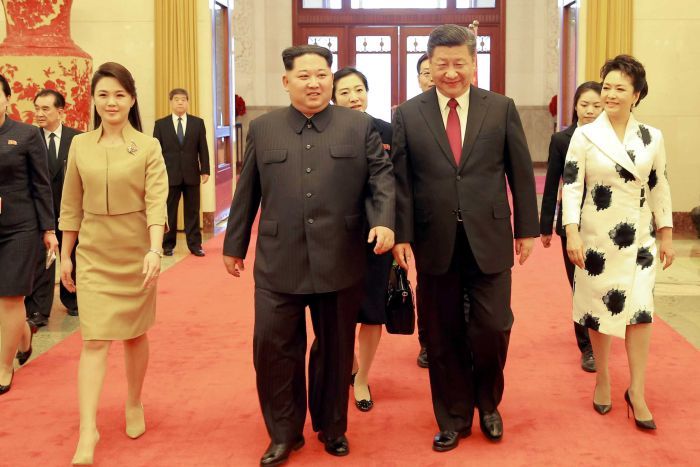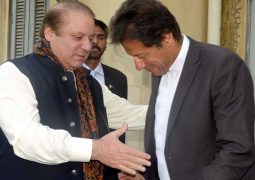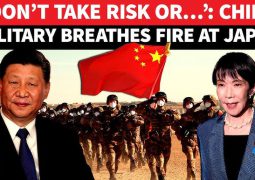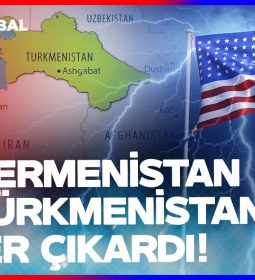Al-Jazeera: China’s shadow looms large over second Trump-Kim summit

By Katrina Yu
22/02/2019
As North Korea’s main ally, Beijing is keen on concrete results in upcoming Vietnam meeting, including denuclearisation.
Beijing, China – All eyes were on Singapore in June last year as a jumbo jet carrying Kim Jong Un landed on the tarmac of the city-state’s Changi airport, days before the North Korean leader’s landmark summit with US President Donald Trump.
As Kim took his first steps onto Singaporean soil, having completed his longest trip abroad as head of state, those watching noted that he hadn’t disembarked from a North Korean airline – but a Chinese one.
Beijing’s loan of the Air China 747 carrier made logistical sense. It provided Kim with a far more reliable mode of transport for the 4,800km trip to Singapore than his own decades-old official aircraft.
The move was symbolic besides being practical. Although China – North Korea‘s main ally – was not physically present at the Singapore meeting aimed at reviving stalled nuclear talks, it played a key role.
“China’s blessing is important for North Korea,” Tong Zhao, a nuclear policy fellow at the Beijing-based Carnegie-Tsinghua Centre for Global Policy, told Al Jazeera. Without Chinese support, he added, Pyongyang may fear being “strong-armed into an unfair deal”.
 |
| Kim waves from a train in Beijing on January 10, 2019 [KCNA via Reuters] |
And now, with another summit between the United States and North Korea set to take place at the end of this month in Vietnam, Beijing has been just as influential.
“China does not want to be pushed aside by the Trump-Kim summit; it wants to have a role in shaping it,” Carlyle Thayer, a security consultant and emeritus professor at The University of New South Wales in Australia said.
When Kim arrived in Beijing on a bulletproof train at the invitation of Chinese President Xi Jinping last month, speculation over a second, upcoming meeting with Trump was mounting.
The trip marked the once-reclusive North Korean leader’s fourth summit with Xi in the past year, including his first-known diplomatic foray overseas with a visit to the Chinese capital in March 2018, all of which came before and after talks with either Trump or the South Korean President Moon Jae-in.
“The four visits seem an effort to get them both on the same sheet of music,” Thayer told Al Jazeera. “It indicates some kind of coordination.”
 |
| Xi Jinping and Kim Jong Un have held four meetings over the past year [KCNA via Reuters] |
A strategic partnership
China is North Korea’s largest economic trading partner. Beijing’s support for Pyongyang dates back to the Korean War (1950-1953) when Chinese troops were sent to the Korean Peninsula to aid the North’s forces. Former Chinese leader Mao Zedong once described the relationship between the two countries as “close as lips and teeth”.
But these brotherly ties began to deteriorate when North Korea began testing its missiles in 2006, before hitting further lows in 2017 after Pyongyang began ramping up its nuclear tests.
“China was very irritated when Kim was firing his ballistic missiles and setting off explosions,” Thayer said. “It brought threats from Trump as trade issues were rising,” he added, referring to a major tariff dispute between the world’s two largest economies.
“It complicated the situation enormously.”
According to Zhao, China’s renewed closeness with North Korea does not stem from “mutual trust” but from “mutual benefit”. He said China’s ultimate goal was denuclearisation on the Korean Peninsula while maintaining its influence on the region.
“As long as North Korea possesses nuclear weapons, it will be an excuse for South Korea and Japan to continue enhancing their own military capabilities, and for the US to strengthen its alliances in the region and to continue deploying missile defence and other advanced military assets near China’s doorstep,” Zhao added. “That is a major cause for concern in China.”
Cheng Xiaohe, a professor of Korean studies at China’s Renmin University, said Beijing supported the Trump-Kim summit because it saw it as a crucial step towards stability in the region.
“Nuclear issues have been bothering the whole of Northeast Asia,” Cheng told Al Jazeera, adding that China believed a positive outcome would help transform North Korea from “a country that used to be the origin of tensions and wars, to one that’s stable and peaceful”
- Previous Rohingya activists demand action against Myanmar at NYC summit
- Next Erdogan, Trump discussed U.S. withdrawal from Syria in phone call















